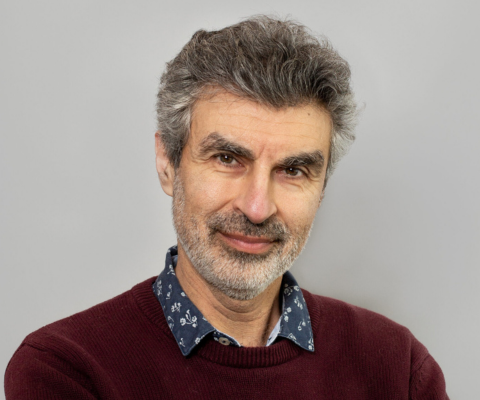Yoshua Bengio
‘Godfather’ of deep learning working to address gap in AI
“I’m as passionate as ever,” says Yoshua Bengio when asked what’s on the horizon for his research. “If we look at the current state of the art in AI, there is still, in my opinion, a big gap.” The unanswered questions, he says, centre on the mysteries of humans’ conscious thinking.
“It’s a gap that I and others think will not be filled by simply doing more engineering and having larger models, doing more computation and so on; there are some principles missing,” says the Université de Montréal professor.
“So this is driving my research. The hypothesis that we are exploring is that it has to do with high-level functioning. It’s about the things that you do consciously, things that you can verbalize.”
Dr. Bengio is the 2022 winner of the prestigious Princess of Asturias Award for Technical and Scientific Research, along with colleagues Geoff Hinton (University of Toronto), Yann LeCun (New York University) and Demis Hassabis (DeepMind) – regarded as the godfathers of deep learning.
He is founder and scientific director of Mila, the Quebec AI institute, a community of more than 1,000 researchers specializing in machine learning, and the world’s largest academic research centre for deep learning. Dr. Bengio also co-directs the CIFAR Learning in Machines & Brains program and is Scientific Director of IVADO, an AI research and transfer institute.
Deep learning uses neural networks for voice recognition, computer vision and language processing. It beat world champions at the most intellectual games and achieved a breakthrough in biology by learning how to predict protein structure from their sequence. Deep learning aims to mimic the functioning of the human brain, using algorithms to convert the biological process of learning into mathematical formulae that computers can implement. The goal is for a machine to learn from its own experience.
Dr. Bengio says that current deep learning is really good at doing things that humans do unconsciously, without having to think about them. But when it comes to the conscious thinking guiding our actions, there’s a kind of computation going on in our brains that scientists don’t yet fully understand.
“We have a lot of information, a lot of clues about the brain that have inspired deep learning, but in order to maybe propel the next generation of AI systems we should also incorporate these other attributes of human intelligence, of higher-level cognition, that currently, I think, are missing.”
His pioneering work in deep learning also earned Dr. Bengio the 2018 Turing Award, regarded as ‘the Nobel Prize of Computing,’ along with Dr. Hinton and Dr. LeCun.
Dr. Bengio says Canada’s growth and impact in AI has been impressive. “In terms of the growth of our AI ecosystem, and in terms of our scientific production, it’s been amazing. In the last few years, we’ve attracted some of the best researchers in AI from across the world.” The country’s position as a global leader in AI has been boosted in recent years by significant government investments in the field, he notes.
“Here in Montreal, we have a huge critical mass of these people – especially in deep learning, which is the part of AI that has been so successful and that industry is so excited about and investing in and deploying across many sectors of society.
Photo credit: Camille Gladu-Drouin

